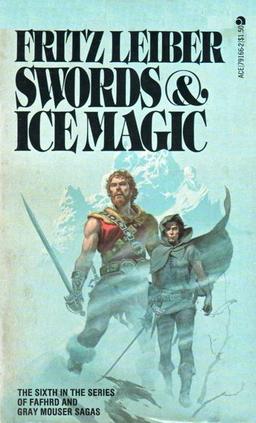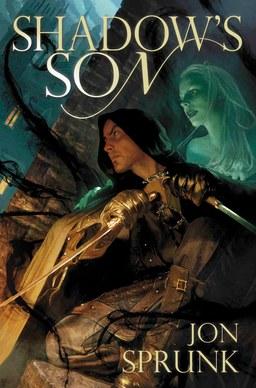War – What is it Good For? Violence in Fantasy Literature
 I grew up on pulp fantasy, enthralled by the adventures of Conan, John Carter, Elric of Melnibone, Fafhrd and the Gray Mouser, and others of that ilk.
I grew up on pulp fantasy, enthralled by the adventures of Conan, John Carter, Elric of Melnibone, Fafhrd and the Gray Mouser, and others of that ilk.
They didn’t shirk from danger, whether it be breaking into a wizard’s lair to purloin a rare jewel, battling hordes of evil minions, or challenging the gods themselves. Violence — the bloody conflict between brawny people with big, pointy weapons — was their meat and mead.
And when it came time to unleash my inner voices and craft my own tales, I drew most heavily upon the works of those old masters. At first, I didn’t delve much into my own motivations for doing so. It was enough that I was writing stories that I enjoyed and that (eventually) others seemed to like as well.
But what was I doing? All this fictional bloodshed and the mountains of imaginary bodies piled up before the altar of reading entertainment — what was it good for? Is it wrong for me to perpetuate a style of literature where problems are so often solved with swords and arrows?
(Okay, I want to pause here and tell you that when I read back that last line, my initial reaction is, “Hell no! I’m doing a public service!” Back to the article.)
When I was planning Shadow’s Son, the first book in my Shadow Saga, the main character Caim was originally going to be a thief by profession. I even played with the idea of portraying him as a pacifist, a sort of anti-Conan. Yet, I eventually came to the conclusion that the story would be more satisfying to… well, to me, for starters… if I changed him to an assassin. Still roguish and anti-establishment, but with a much higher THAC0.
Perhaps I should have felt a little guilty about that, but it opened up a world of new conflicts and tensions for the story. And it changed my perception of the character more than I thought it would. Caim went from a passive hero to a highly aggressive presence, dominating scene after scene in a way that was thrilling to write.
 Also, it allowed me delve into the complex issues of what happens after the violence is over. How does a person react to a life-and-death fight — physically and emotionally? What does a lifetime of violence do to a person’s psyche? And those are the questions that really resonated with me throughout the series.
Also, it allowed me delve into the complex issues of what happens after the violence is over. How does a person react to a life-and-death fight — physically and emotionally? What does a lifetime of violence do to a person’s psyche? And those are the questions that really resonated with me throughout the series.
So, to answer my own question, what is war (violence) good for? I think it’s revealing. I’ve often said that writing a fight scene is a lot like writing a sex scene. There needs to be emotional content — feelings that drive the action — or it’s all just blood-spattered puppetry.
When I think back to Robert E. Howard’s Conan, he fought to defend himself (which happened a LOT, considering he was a huge, muscular barbarian), to defend others, and to punish the wicked. That barbaric code of honor was one of the things that made him such an interesting character. He lived in a violent world, and he met it head-on without flinching.
As a reader, I think there’s something noble in that. As a writer, it’s a wellspring of inspiration.
Nope, I don’t feel one bit guilty. While my characters don’t always reach for a sword or crossbow to solve all their problems — and some of them are downright nice people — it’s reassuring to know that some of them are willing to fight, and even kill, for their convictions.
Jon Sprunk is the author of the Shadow Saga (Shadow’s Son, Shadow’s Lure, and Shadow’s Master). The first book of his new epic fantasy series, Blood and Iron, will be released in March 2014. He is also a mentor at the Seton Hill University Writing Program. For more on his life and works, visit www.jonsprunk.com.
> it’s reassuring to know that some of them are willing to fight, and even kill, for their convictions.
Yes, that’s too easily forgotten.
As both a writer and reader, there’s nothing better than seeing a deserving bad guy be on the receiving end of the brutality he’s parceled out. I remember a Clive Cussler novel–I can’t recall which one–in which, after knocking the bad guy unconscious, Dirk Pitt systematically breaks all the bones in his arms and legs, a fate the character richly deserved. It was brutal, but it was also supremely satisfying, in a way that real life never is (and that’s probably for the best).
Hi Jon,
+1 for the Thac0 reference.
Anyway, I think there is a reaction in some quarters to violence in F and SF–that readers (especially young readers) need models of non-violence as well as violence in their fiction.
I think you did a good job in having Caim deal with the consequences of the violence he committed, or the violence done to those who follow him (sometimes without his real desire for such a thing).
Violence does not solve everything. But neither does it solve nothing. Ask the City Fathers of Carthage, after all
i would love to draw your attention to the fact that gentlemen of the road by m. chabon features no killing by protagonists. they defeat various bad guys but none are killed. it is interesting. also i always felt that murder is the last resort for leiber’s heroes.
Call me a anti-social, hoodlum full of hate but the violence is a big part of the reason I love fantasy, particularly the fantasy sub-genres like S&S, Heroic, Grimdark, or the new Flintlock fantasy. And for that matter, the same reason I love Westerns.
I mean c’mon, who hasn’t daydreamed about b!tc#-slapping that @$$hole boss, Or coming to the rescue of the damsel in distress with some well excuted Bruce Lee moves? We can’t do those things in real life, -well we can but freakin’ jail sux- but its nice to escape to a world were one’s combat skills is a huge asset. But its not just the violence. It’s the honor -actually for me its more about having a code to stick to than honor- and courage and defiance against the odds of which violence is often a by-product of.
Also, as lover of Louis Lamour -who was a big influence on David Gemmell- his reoccurring theme was that it took bad men, and men of violence to settle an uncivilized land. (not sure if that really adds to this conversation or not, now that I read it)
oh…not lover… big fan of Louis Lamour. I never even met the man. :)I wish we could go back and edit our comments. 🙁
Violence not only solves problems, it does so dramatically. How useful in a story.
A work of fantasy that really stands out for its provocative treatment of violence is Stephen R. Donaldson’s amazing First Chronicles of Thomas Covenant the Unbeliever. In those books the morality of violence in a secondary world is just as messy and complicated as it is in real life- violence tends to have unintended consequences and whether the protagonists are justified in their use of violence is often ambiguous.
FUN READ, Thanks! Very well-done, spread this far and wide; if this can’t excite the adventure juices in any red-blooded human, nothing can!
I thought Abercrombie handled a lot of this stuff pretty well in THE HEROES, a book I loved, and the first real fantasy I’d read in quite some time (outside of some re-reads of stuff). War was brutal and hard, mercenaries were just doing a job, not all the problems could be solved with violence, etc. I enjoyed that, and I love the heroic fiction you refer to (add another + for the THACO reference!). I’ll definitely check your stuff out, Jon.
[…] War — What is it Good For? Violence in Fantasy Literature […]
I think violence in fantasy can change dependant on what you want from it; as kid_greg said it’s nice to have a bit of escapism and loose yourself in a world where larger then life heroes can duke it our with larger then life villains, but it can also add to the story, as other commenter’s have mentioned, it could produce new tensions, new conflicts as well as moral ambiguity, all of which can effect every aspect of a good yarn.
Oh and Jon
Your work seems like a nice balance between the two here, might have to check it out. 😀
Connor, I do my best. And thanks!